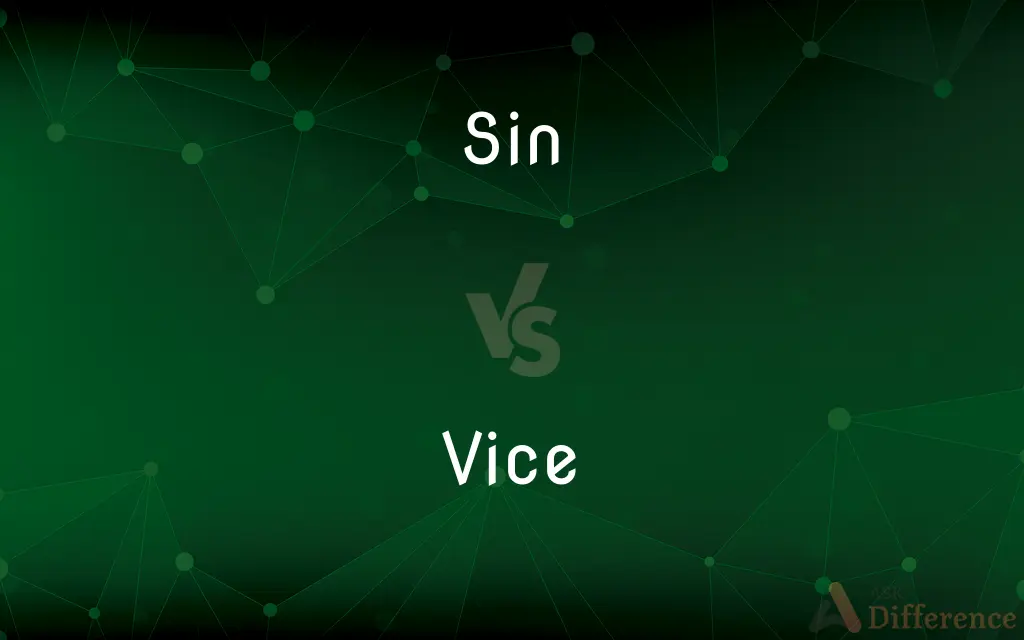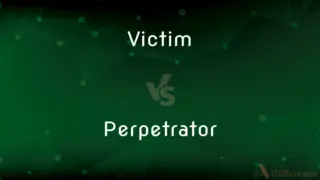Sin vs. Vice — What's the Difference?
Edited by Tayyaba Rehman — By Urooj Arif — Updated on March 29, 2024
Sin refers to a moral wrongdoing according to religious beliefs, while vice is a habitual bad habit or moral flaw.

Difference Between Sin and Vice
Table of Contents
ADVERTISEMENT
Key Differences
While sins are often specific actions or thoughts that are considered wrong, vices are more about a person's character or disposition towards certain types of behavior. A vice can be seen as a predisposition or a habitual inclination to perform acts that could be considered sinful or morally wrong. This distinction highlights the difference in scope between committing an act considered a sin—a specific event—and possessing a vice, which indicates a more permanent trait or aspect of one's character.
The concept of sin usually involves a path to redemption or forgiveness, especially within the religious traditions that define these acts as sinful. This path can involve confession, repentance, and performing acts of penance. Vice, however, is often addressed through personal growth, self-reflection, and the development of virtues that counteract these negative traits. The approach to overcoming vice is more about character development and self-improvement than seeking divine forgiveness.
The societal and cultural perception of sin and vice can vary widely. Sins are often viewed through the lens of religious morality and are subject to the doctrinal beliefs of a particular faith. In contrast, vices are generally recognized by a broader section of society and are often discussed in the context of ethics, psychology, and social health. For example, a society may work to combat the vice of corruption not only because it is considered sinful in religious contexts but also because it undermines social trust and governance.
Both sin and vice have significant implications for personal and societal morality, but they operate within different frameworks of understanding moral behavior. Sin requires adherence to religious laws and teachings, whereas vice calls for an understanding of ethical behavior and character development. The distinction is crucial for addressing moral failings in a way that aligns with both religious beliefs and secular ethics.
Comparison Chart
Definition
A moral wrongdoing according to religious beliefs.
A habitual bad habit or moral flaw.
ADVERTISEMENT
Context
Religious, involves transgression against divine law.
Can be religious or secular, focuses on character flaws.
Scope
Specific actions or thoughts.
Dispositions or habits.
Path to Correction
Often involves repentance and seeking divine forgiveness.
Focuses on personal growth and developing virtues.
Perception
Defined by religious doctrines.
Recognized by broader society, often in ethical terms.
Examples
Lying, stealing (based on the Ten Commandments).
Greed, gluttony, envy (recognized as detrimental habits).
Compare with Definitions
Sin
Can be committed through thought, word, or deed.
Coveting someone else's property is seen as a sin in many faiths.
Vice
A deep-seated habit of doing something morally wrong.
Habitual lying is considered a vice.
Sin
Often involves a community's moral guidance.
Religious leaders provide counsel to help believers avoid sin.
Vice
Seen as detrimental to one's character.
Greed is a vice that can lead to unhappiness.
Sin
Requires repentance and divine forgiveness.
Confession is a sacrament in Catholicism for repenting sins.
Vice
Can be secular or religious in context.
Gluttony is viewed as a vice in both religious teachings and secular ethics.
Sin
Defined by specific religious teachings.
The concept of original sin is unique to Christianity.
Vice
Recognized by society for their harmful effects.
Societies often aim to reduce vices like corruption and greed.
Sin
In a religious context, sin is a transgression against divine law. Each culture has its own interpretation of what it means to commit a sin.
Vice
Addressed through self-improvement.
Overcoming the vice of envy involves cultivating gratitude.
Sin
An immoral act considered to be a transgression against divine law
The human capacity for sin
A sin in the eyes of God
Vice
A vice is a practice, behaviour, or habit generally considered immoral, sinful, criminal, rude, taboo, depraved, degrading, deviant or perverted in the associated society. In more minor usage, vice can refer to a fault, a negative character trait, a defect, an infirmity, or a bad or unhealthy habit.
Sin
Commit a sin
I sinned and brought shame down on us
Vice
A practice or habit considered to be evil, degrading, or immoral
The vices of smoking and drinking.
Sin
A transgression of a religious or moral law, especially when deliberate.
Vice
Wicked or depraved conduct or habits; corruption
"sharpers, desperadoes, pirates, and criminals steeped in vice" (Carl Holliday).
Sin
Deliberate disobedience to the known will of God.
Vice
Prostitution, the sale of illegal drugs, and certain other forms of usually nonviolent criminal behavior.
Sin
A condition of estrangement from God resulting from such disobedience.
Vice
A slight personal failing; a foible
The vice of untidiness.
Sin
Something regarded as being shameful, deplorable, or utterly wrong.
Vice
A flaw or imperfection; a defect
"Lady Hester remarked on the vice in his looks" (Edna O'Brien).
Sin
One of the two forms of the 21st letter of the Hebrew alphabet, distinguished from the letter shin by having a dot above the left side of the letter. See Table at alphabet.
Vice
Vice A character representing generalized or particular vice in English morality plays.
Sin
The Babylonian god of the moon.
Vice
A jester or buffoon.
Sin
To violate a religious or moral law.
Vice
Variant of vise.
Sin
(theology) A violation of God's will or religious law.
As a Christian, I think this is a sin against God.
Vice
In place of; replacing
Ms. Fine acted as treasurer, vice Mr. Smith.
Sin
Sinfulness, depravity, iniquity.
Vice
A bad habit.
Pride is a vice, not a virtue.
Smoking was a vice Sally picked up in high school.
Sin
A misdeed or wrong.
Vice
(legal) Any of various crimes related (depending on jurisdiction) to weapons, prostitution, pornography, gambling, alcohol, tobacco, or drugs.
Sin
A sin offering; a sacrifice for sin.
Vice
Clip of vice squad
Sin
An embodiment of sin; a very wicked person.
Vice
A defect in the temper or behaviour of a horse, such as to make the animal dangerous, to injure its health, or to diminish its usefulness.
Sin
A flaw or mistake.
No movie is without sin.
Vice
(UK) vise
Sin
A letter of the Hebrew alphabet; שׂ]]
Vice
A tool for drawing lead into cames, or flat grooved rods, for casements.
Sin
A letter of the Arabic alphabet; س
Vice
(architecture) A winding or spiral staircase.
Sin
To commit a sin.
Vice
(obsolete) A grip or grasp.
Sin
Old form of Since.
Sin that his lord was twenty year of age.
Vice
One who acts in place of a superior.
Sin
Transgression of the law of God; disobedience of the divine command; any violation of God's will, either in purpose or conduct; moral deficiency in the character; iniquity; as, sins of omission and sins of commission.
Whosoever committeth sin is the servant of sin.
Sin is the transgression of the law.
I think 't no sin.To cozen him that would unjustly win.
EnthralledBy sin to foul, exorbitant desires.
Vice
Alternative spelling of vise
Sin
An offense, in general; a violation of propriety; a misdemeanor; as, a sin against good manners.
I grant that poetry's a crying sin.
Vice
In place of; subordinate to; designating a person below another in rank
Vice president
Vice admiral
Sin
A sin offering; a sacrifice for sin.
He hath made him to be sin for us, who knew no sin.
Vice
(dated) instead of, in place of, versus (sense 2)
Sin
An embodiment of sin; a very wicked person.
Thy ambition,Thou scarlet sin, robbed this bewailing landOf noble Buckingham.
Vice
A defect; a fault; an error; a blemish; an imperfection; as, the vices of a political constitution; the vices of a horse.
Withouten vice of syllable or letter.
Mark the vice of the procedure.
Sin
To depart voluntarily from the path of duty prescribed by God to man; to violate the divine law in any particular, by actual transgression or by the neglect or nonobservance of its injunctions; to violate any known rule of duty; - often followed by against.
Against thee, thee only, have I sinned.
All have sinned, and come short of the glory of God.
Vice
The buffoon of the old English moralities, or moral dramas, having the name sometimes of one vice, sometimes of another, or of Vice itself; - called also Iniquity.
How like you the Vice in the play? . . . I would not give a rush for a Vice that has not a wooden dagger to snap at everybody.
Sin
To violate human rights, law, or propriety; to commit an offense; to trespass; to transgress.
I am a manMore sinned against than sinning.
Who but wishes to invert the lawsOf order, sins against the eternal cause.
Vice
A kind of instrument for holding work, as in filing. Same as Vise.
Sin
Estrangement from god
Vice
A tool for drawing lead into cames, or flat grooved rods, for casements.
Sin
An act that is regarded by theologians as a transgression of God's will
Vice
A gripe or grasp.
Sin
Ratio of the opposite side to the hypotenuse of a right-angled triangle
Vice
To hold or squeeze with a vice, or as if with a vice.
The coachman's hand was viced between his upper and lower thigh.
Sin
(Akkadian) god of the moon; counterpart of Sumerian Nanna
Vice
In the place of; in the stead; as, A. B. was appointed postmaster vice C. D. resigned.
Sin
The 21st letter of the Hebrew alphabet
Vice
Denoting one who in certain cases may assume the office or duties of a superior; designating an officer or an office that is second in rank or authority; as, vice president; vice agent; vice consul, etc.
Sin
Violent and excited activity;
They began to fight like sin
Vice
Moral weakness
Sin
Commit a sin; violate a law of God or a moral law
Vice
A specific form of evildoing;
Vice offends the moral standards of the community
Sin
Commit a faux pas or a fault or make a serious mistake;
I blundered during the job interview
Common Curiosities
Can someone be morally good despite having vices?
While everyone has flaws, the effort to overcome vices and cultivate virtues is often seen as indicative of moral character.
Is every vice a sin?
While all vices can be considered sins in many religious contexts, not every vice is defined as a sin across all religions or secular viewpoints.
Do all cultures agree on what constitutes a sin or a vice?
There is significant variation across cultures and religions regarding what behaviors are considered sinful or viceful, reflecting differing moral and ethical standards.
Can a sin be not a vice?
Yes, sins can be specific actions or thoughts that are not necessarily habitual or character-based, thus not fitting the definition of a vice.
How do modern societies address traditional sins and vices?
Modern societies address sins and vices through a combination of legal systems, ethical education, and cultural norms promoting virtuous behavior.
How do religions typically address vices?
Religions address vices by promoting the cultivation of virtues, such as patience against anger or generosity against greed, and through moral teachings.
Are vices always negative?
Yes, by definition, vices are considered harmful either to the individual or to society and are thus viewed negatively.
Is it possible to eliminate a vice entirely?
While it can be challenging, individuals can work towards significantly reducing or managing their vices through personal development and ethical practice.
Can legal systems effectively address vices?
Legal systems can deter certain vices through penalties but addressing the root causes often requires social and educational efforts.
How does personal accountability factor into sins and vices?
Personal accountability is crucial in recognizing and addressing both sins and vices, fostering growth and ethical behavior.
How does society benefit from addressing vices?
Addressing vices can lead to healthier, more ethical communities with stronger social bonds and trust.
Can vices change over time?
Yes, societal perceptions of what constitutes a vice can evolve, reflecting changes in moral and ethical norms.
What role does education play in addressing sin and vice?
Education, both religious and secular, can play a crucial role in teaching individuals about the consequences of sin and vice and the importance of virtues.
Is addiction considered a sin or a vice?
Addiction is often seen in the context of vice due to its habitual nature, but modern understanding also views it as a medical condition requiring treatment.
Share Your Discovery

Previous Comparison
Wasteland vs. Desert
Next Comparison
Victim vs. PerpetratorAuthor Spotlight
Written by
Urooj ArifUrooj is a skilled content writer at Ask Difference, known for her exceptional ability to simplify complex topics into engaging and informative content. With a passion for research and a flair for clear, concise writing, she consistently delivers articles that resonate with our diverse audience.
Edited by
Tayyaba RehmanTayyaba Rehman is a distinguished writer, currently serving as a primary contributor to askdifference.com. As a researcher in semantics and etymology, Tayyaba's passion for the complexity of languages and their distinctions has found a perfect home on the platform. Tayyaba delves into the intricacies of language, distinguishing between commonly confused words and phrases, thereby providing clarity for readers worldwide.
















































